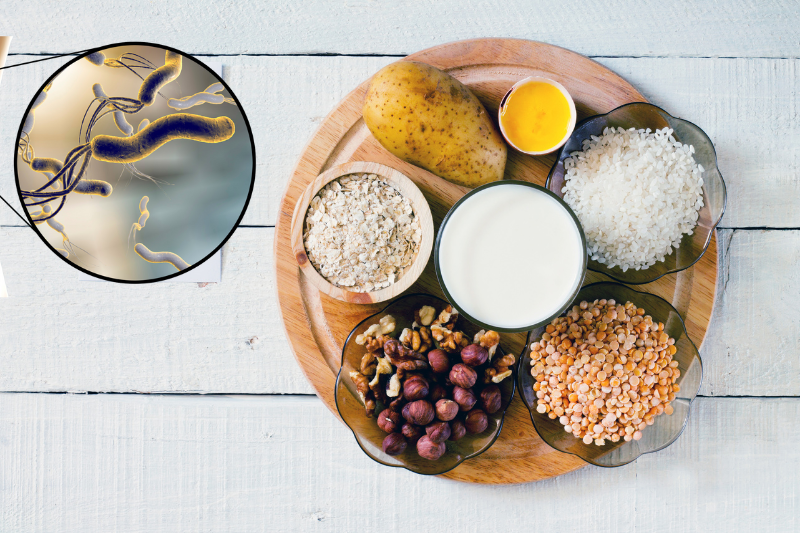When most people think of H. pylori infection, they imagine stomach pain, ulcers, or acidity. But this common gut infection can also affect your overall health in surprising ways—including unexplained weight loss and even hair fall.
If you’ve been losing weight without trying or noticing thinning hair along with digestive issues, H. pylori may be playing a role. Let’s explore how.
What Is H. pylori?
Helicobacter pylori (H. pylori) is a spiral-shaped bacterium that lives in the stomach lining. It survives harsh stomach acid by producing an enzyme called urease, which weakens the stomach’s protective lining.
This often leads to gastritis, ulcers, bloating, and indigestion, but its effects don’t stop there—it also impacts nutrient absorption and overall metabolism.
How H. pylori Causes Unintended Weight Loss
Unexplained weight loss is a lesser-known symptom of H. pylori infection. Here’s why it happens:
- Reduced Appetite – Ongoing nausea, stomach discomfort, and bloating can make it hard to eat enough food.
- Poor Nutrient Absorption – H. pylori damages the stomach lining, interfering with absorption of key nutrients like iron, B12, and protein.
- Increased Inflammation – Chronic gut inflammation alters metabolism, sometimes leading to muscle loss.
- Ulcer Pain – Stomach ulcers caused by H. pylori can make eating painful, leading to reduced calorie intake. Over time, this can lead to unintended weight loss and weakness.
The Link Between H. pylori and Hair Fall
Hair health depends on proper nutrition—especially iron, B12, folate, and protein. H. pylori infection disrupts this balance in multiple ways:
Iron Deficiency
→ H. pylori is strongly linked with iron-deficiency anemia, a leading cause of hair thinning.
Vitamin B12 Deficiency
→ Poor stomach function reduces absorption of B12, vital for hair growth and healthy red blood cells.
Chronic Stress on the Body
→ Infections and inflammation put the body in “survival mode,” redirecting resources away from hair growth.
Gut Imbalance
→ Since H. pylori disrupts gut bacteria, nutrient absorption is further compromised. This explains why many people with long-term H. pylori infection complain of diffuse hair loss or thinning.
Signs You May Have H. pylori
- Persistent bloating, burping, or acidity
- Stomach pain (especially between meals)
- Nausea or vomiting
- Unexplained weight loss
- Hair thinning or shedding
- Fatigue due to iron/B12 deficiency
Healing From H. pylori Naturally (Alongside Treatment)
If you’re being treated for H. pylori (usually with antibiotics + acid reducers), nutrition and lifestyle support are key for recovery and preventing side effects like weight loss and hair fall.
Nutrition Tips
- High-protein meals → eggs, fish, lentils, and chicken support muscle and hair growth.
- Iron-rich foods → spinach, pumpkin seeds, beetroot, legumes, lean red meat (if tolerated).
- B12 sources → eggs, dairy, fish, or supplements if deficient.
- Probiotic foods → yogurt, kefir, sauerkraut, kombucha to restore gut flora.
- Anti-inflammatory foods → turmeric, ginger, green leafy vegetables, omega-3 rich foods.
Natural Remedies (Supportive)
- Green tea & broccoli sprouts → may suppress H. pylori growth.
- Manuka honey & garlic → antibacterial properties.
- Bone broth & collagen → support gut lining repair.
Lifestyle Habits
- Eat smaller, frequent meals to reduce stomach load.
- Manage stress (yoga, breathing, meditation).
- Avoid smoking, alcohol, and excessive coffee.
- Stay hydrated to support digestion and nutrient transport.
Final Thoughts
H. pylori isn’t just a stomach infection—it affects your whole body. By interfering with digestion and nutrient absorption, it can lead to unintended weight loss and hair fall if left untreated.
The good news? With proper treatment, a nutrient-dense diet, and gut-healing strategies, you can reverse these effects, regain lost weight, and restore hair health.
If you notice ongoing digestive issues alongside hair thinning or unexplained weight changes, it may be time to test for H. pylori and take action.


